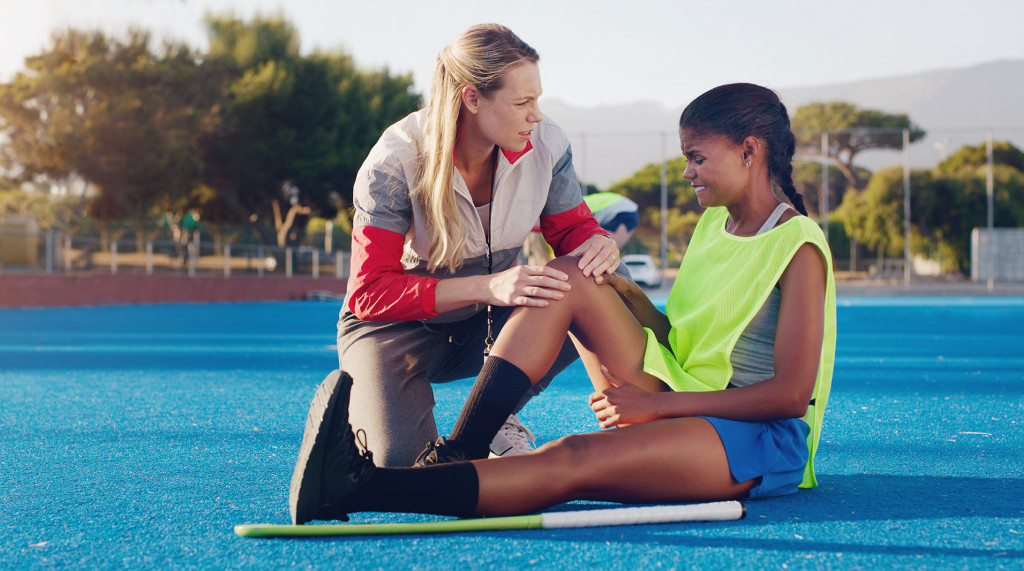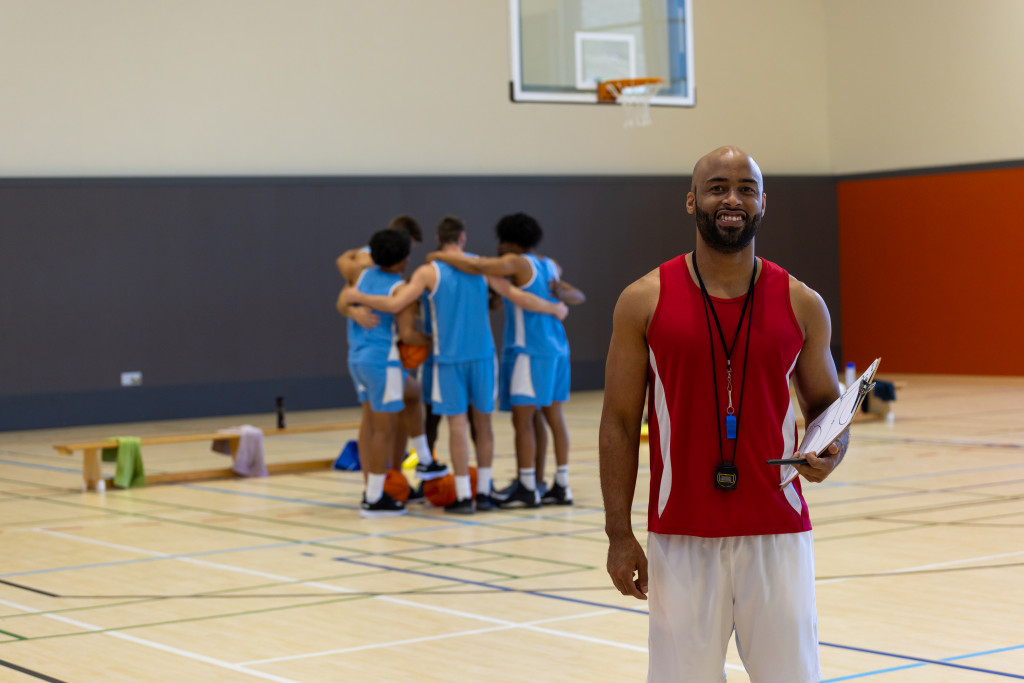Explore careers that build on your athletics background — and learn how Russell Sage College’s degree programs can help you get there.
Turn Your Love of Sports Into a Career
Many young adults with athletics backgrounds choose careers where they can stay connected to sports and physical fitness.
Keep reading to learn about the Russell Sage degrees that lead to rewarding careers in physical therapy, nutrition science, physical education and coaching, and sports management.
Physical Therapist: Helping Athletes Heal and Return to Play

Physical therapists work with people recovering from physical limitations — including athletes aiming to achieve peak performance. PTs help patients build strength, restore mobility, and get back to doing what they love.
Brendan Espinal — named Empire 8’s Baseball Player of the Year in 2024 — credits physical therapy with helping him grow as an athlete and inspiring him to pursue a Doctor of Physical Therapy degree.
Chances are his baseball background will be a major asset when he enters physical therapy practice. Former athletes understand the drive to return to competition and the emotional toll injuries can take. That perspective builds credibility and trust with all patients, especially with those seeking sports-specific physical therapy treatment.
That’s been the case for Vincent Corrado, physical therapist for the U.S. Ski & Snowboard Men’s Alpine World Cup Tech team.
“My expertise as a physical therapist and a former ski racer really helps me connect with my athletes,” said Corrado. “When an athlete said, ‘Hey, I am having trouble on the steep parts during a certain turn,’ or ‘My outside ski is not gripping,’ I’m able to use all my knowledge to determine if a deficit in their body mechanics could be contributing to the problem.”
How to Become a Physical Therapist
To become a physical therapist, you will have to earn a bachelor’s degree and a physical therapy doctorate. It typically takes about seven years to complete both degrees, but an accelerated physical therapy program makes it possible to complete a bachelor’s and DPT in only six years.
Undergraduate majors in biology, health sciences, and psychology typically meet the prerequisites for admission to DPT programs (another bonus for fitness-focused students: the health sciences major at Russell Sage offers a concentration in exercise science.)
Once you earn a bachelor’s degree and Doctor of Physical Therapy degree, you will be eligible to take the National Physical Therapy Examination. The exam is administered by the Federation of State Boards of Physical Therapy, and you must pass it as well as meet any additional state licensing requirements to practice as a physical therapist.
Licensed physical therapists may choose to pursue additional certification as a Sports Clinical Specialist or in another specialty area through the American Board of Physical Therapy Specialties.
Teaching and Coaching: Inspiring the Next Generation

If you love sports and staying active, teaching physical education or health education and coaching is a great way to pass that passion on.
If you choose Russell Sage College for your teacher education programs, you’ll also graduate with training in Positive Education. Positive Education combines principles of well-being and mental health with teaching practice, which resonates with many athletes.
How to Become a Physical Education Teacher
The National High School Strength Coaches Association 2023 Coach of the Year ZaQuan Irby had been a varsity athlete in high school. His community college advisor encouraged him to study physical education, and it set him on a path to a career as a PE teacher and track and football coach.
Irby is especially proud of the strength and conditioning course he created at his high school, which also helped his school stand out for recognition as a NHSSCA Program of Excellence.
“I’ve received messages from some of my top Division I athletes expressing their appreciation for the class, as it has given them an edge over other first-year students at their college,” he said.
So how do you follow in Irby’s footsteps to become a PE teacher and coach?
The first step to becoming a physical education teacher is to earn a bachelor’s degree. Russell Sage’s physical education degree program includes the coursework and student teaching experiences required to take New York state’s teacher certification exams and apply for initial certification, which is valid for five years.
A master’s degree is required for permanent teaching licensure in New York state, and there are several options for a master’s degree. Keep reading to learn about two different options that are especially appealing to athletes.
Professional Teacher Certification with a School Health Education Master’s
The Master of Science program in School Health Education at Russell Sage prepares future health teachers for initial or professional certification in grades K-12 in New York state.
A master’s in health education is an especially great fit for physical education teachers with initial certification. This degree complements your physical fitness expertise and prepares teachers to educate students about topics like nutrition, mental and emotional well-being, substance abuse prevention, sexual health, and the impact of daily choices.
Professional Teacher Certification with a Sport Science: Coaching and Mental Performance Master’s
Russell Sage’s online M.S. in Sport Science: Coaching and Mental Performance is another option for physical education teachers in New York who are seeking a master’s for professional teacher certification. It’s also ideal for current or aspiring coaches at every level, from youth sports through professional competition.
This program combines coursework in strength and conditioning with mental performance strategies rooted in sport psychology, and course materials align with the Certified Strength and Conditioning Specialist exam for students pursuing that credential!
Students appreciate the program’s real-world relevance and focus on both body and mind. As student Joe DeGroot put it:
“The program has done a great job of implementing psychology into sports, as well as discussing the physical aspects of sport. The mental side of sports is often neglected, and this program helps us understand how we can help improve the mental aspect of athletics. It’s helped me become a better player and coach because I can relate the material to my own experience as a college athlete.”
Registered Dietitian Nutritionist: Fueling Athletic Performance

“I went into sports nutrition specifically to help athletes,” said Registered Dietitian Nutritionist Kileigh Job, a former gymnast. “I wish I knew then what I know now … I think I would have prevented injuries, or felt a lot better, performed better, and gotten to a higher level. Nutrition can really make that difference in your performance and recovery.”
Today, Job teaches sports nutrition at Russell Sage, where she also earned her master’s in Nutrition and Dietetics. She works with Division I student-athletes as a campus dietitian at a nearby college and serves as a nutrition coach for high school athletes nationwide through IMG Academy.
So what does it take to turn your love of sports and interest in nutrition into a career as a Registered Dietitian Nutritionist?
How to Become a Registered Dietitian Nutritionist
To become a Registered Dietitian Nutritionist, you’ll need a bachelor’s degree, master’s degree,
supervised practice through a Dietetic Internship, and a passing score on the Registration Exam for Dietitians.
Some students start with a bachelor’s in nutrition science, which includes the required coursework (called the Didactic Program in Dietetics or DPD) for a Dietetic Internship. You can still become an RDN with a degree in another field — you may just need to complete a few prerequisites.
The master’s program you choose will depend on your educational background and career goals. At Russell Sage College, students can choose from two graduate programs that can be paired with its Dietetic Internship to fulfill the requirements for RDN eligibility:
- Sage’s M.S. in Applied Nutrition is a good fit for those with a bachelor’s in nutrition or who have completed DPD coursework.
- Sage’s M.S. in Nutrition and Dietetics is designed for students with a bachelor’s in another field, who need to complete DPD courses.
Sport & Recreation Management: Behind the Scenes of the Game

A bachelor’s degree in sport and recreation management is another route to an exciting, athletics-adjacent career.
Sport and recreation management is a business-based degree program that prepares students for careers with professional and minor league teams, college athletics, parks and recreation programs, and more. You’ll explore everything from marketing and public relations to facility operations and event management.
Jaquan Mack is a Sage graduate who has worked with the Albany FireWolves professional lacrosse team and Division I teams at Army West Point Athletics. His sports management degree included classroom visits from industry pros and four internships, all of which helped him build a network and break into the field.
His long-term goal is to become a licensed National Basketball Players Association agent. That will be the pinnacle of his education, experience, and connections, he said.
“It’s a lot of reaching out, a lot of networking and relationship-building,” he said, “and those are things I learned at Sage.
Turn Your Love of Sports Into a Career with a Russell Sage College Degree
If sports have been a big part of your life, Russell Sage College offers a way to keep that connection going, through degrees that connect with health and fitness and NCAA Division III athletics with 22 teams for men and women.
Email [email protected] with questions or apply today!

